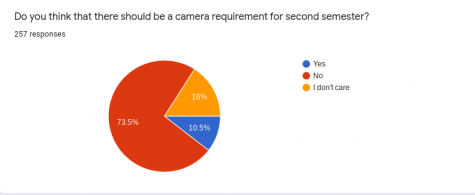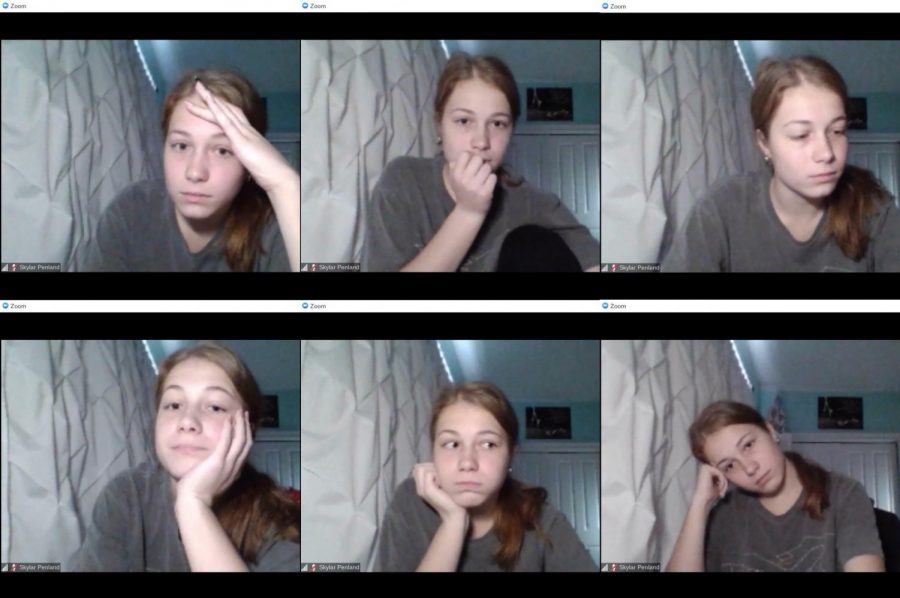A camera-on requirement will do more harm than good
Screenshots on Zoom showing what teachers see when students cameras are on.
A few weeks ago, Central sent out a survey to all students and parents that asked them to rate their experiences with a variety of things from this past semester. Part of the survey asked how students and parents would feel about a potential camera-on requirement for second semester. I was personally quite unsettled by the thought of this. After discussing it with some peers, the consensus was that it would without a doubt do more harm than good.
Understanding that my friends and I don’t make up the majority of the student body, I decided to make my own survey to get an idea of what results the administration was receiving. This was emailed to all students and I received 255 responses, which represents about 10% of students. From my survey, 77% of students said that there should not be a camera requirement for next semester and they all had valid reasons for that choice.

The first big issue that I and many other students have with requiring cameras-on deals with anxiety. This semester has already been more stressful than others in a multitude of ways that never could have been predicted. As a result, more students are dealing with mental health issues due to the stress of quarantine and living through a global pandemic. The school needs to be looking for ways to reduce stress, not increase it.
About 68% of the students who took my survey said that they get anxiety from having their camera on all the time. How does this affect students’ learning? Personally, when I get anxious from Zoom,. I get hot flashes, my hands get shaky, I am unable to focus, and I feel overall extremely uncomfortable. I have learned to deal with this with a few simple steps like turning my camera off, turning my fan on, and taking a few deep breaths; however, with a camera requirement, I would not be able to focus for the rest of class because of how uncomfortable I felt–and this is not just me.
“I have anxiety and I faint and get nauseous when I’m nervous. That’s not something I want my peers and teachers to see, but I can’t control it,” said Kate Lindsey, senior.
Students need privacy, whether to regroup after being cold called on or after giving a speech to their class. Sometimes students can even get anxious in class just by wondering how many people are watching them at that very moment. You feel constantly on display unlike when you are sitting in a classroom.
Furthermore, students feel self-conscious of how they look on Zoom, and that can be very distracting. This is not the same setting as it would be in school. In school, students are faced forward watching the teacher. Over Zoom, anyone can see your facial expression, how you look, etc. at any time. Many students even say that when their camera is on, they are more focused on their reflection than what the teacher is saying.
“I learn better with my camera off because then I’m focusing more on my teacher and what they’re saying and not how my hair looks or how the class sees me,” Lindsey said.
Additionally, it is exhausting staring at a camera for hours each day. In a conventional classroom students don’t just stare at one spot for all of class. Many students focus much better while looking out a window, or anywhere other than the camera, but fear being called out by their teacher for not being focused. I personally was called out in front of my whole class for not focusing because I was looking down at the notes I was taking.
Another very serious concern of many students is that they can’t tell if and when other students are taking pictures or videos of them, which in an in-person setting, they could, and many students do take pictures and videos during class. It is not hard to hold a phone out of the view of the camera and record a video of what is going on in class. In fact, I see these videos on private stories everyday and there is nothing that teachers can do to stop this. By putting in place a camera requirement, Central is opening up the floodgates to bullying, harassment, and invasions of privacy.

Another concern is that many students are self conscious of their home and/or family life. School is usually an escape from this, and in a normal school environment, other students would never see one’s room or family dynamic. The camera requirement, once again, is an invasion of privacy. In high school students already have enough things that they are self conscious about; we don’t need to add more.
“I live in a house of nine people and there is always someone in the background trying to distract me and I don’t want to get singled out in front of my class because of that,” Lindsey said.
Another issue is the technical imperfections of Zoom. Oftentimes students’ microphones don’t work unless their camera is off, and sometimes having your camera on causes the Zoom to get much slower or even crash. Wouldn’t you rather students be able to hear the teacher and listen to the lesson uninterrupted than trying to get back into the Zoom every five minutes?
Camera usage also complicates using other teacher required platforms during class. Many classes use Onenote or Kami for everything this year since teachers want to pass out papers, but if a student is writing on their Chromebook in class, all the camera will pick up is the student’s chin and chest. It is flat-out uncomfortable. While doing other work on their computer, students are constantly worried about how they look to their class as they write their essay or research, rather than being focused on their work.
Finally, in classes like physical education, a camera requirement is not okay. High school is the time that students are most self conscious of their bodies. No one wants to do yoga on camera in front of their entire class.
The problem is clear and simple. Cameras are distracting for students for the myriad of reasons explained above. In the survey, 66% of students who took my survey said they learn better with their camera off.
Additionally, Central is often emphasizing that they want students to learn to become independent during their time at Central and to become responsible for what work they need to get done, but this feels hypocritical when teachers are required to babysit us.
“Students are usually just listening and taking notes which shouldn’t require a camera for [teachers] to just watch us do our work,” Lindsey said, “I wish the faculty had more trust in the students because a camera on requirement honestly just feels like a threat.”
If Central wants students to take responsibility for what they need to get done, they should treat their students accordingly.
Lastly, this is a year for compassion. Most students are doing their best under the circumstances, and even students who wouldn’t mind a camera requirement have compassion for the students in different situations.
“I believe people should have the right to choose whether or not they have their camera on. Some people might feel uncomfortable with their camera on and their decision to have their camera off should be respected,” said Maxwell Meyer, senior.
With all of this said, I understand that teachers have their reasons for wanting this requirement.
“I think it would benefit students. I think it would help improve their level of engagement. I think it would also help foster kind of an E-learning environment, a community of learners even though it’s online,” said Mr. Brian Mitchell, economics teacher.
For some students maybe it would help and increase engagement, but for the majority it is just an extra stressor. Additionally, students have the option to turn their cameras on if they feel it would help them stay engaged. Once again, shouldn’t students be learning to be responsible for themselves and their grades?
At the end of the day, students are learning through a global pandemic, and as hard as teachers try to do what they think is best for the students, they haven’t been in our shoes. No teacher has had to experience E-learning and the stress that it entails. It’s different. Students get that the teachers are trying, but so are students. Please listen to our feedback and seriously consider our points of view.
A camera requirement is not the solution to the problems everyone is experiencing with E-learning.

Skylar, a senior, is excited to join the Devils’ Advocate Team. She loves dancing and doing yoga. Skylar is an executive member of The Community House’s...















cool • Feb 13, 2021 at 1:19 pm
The whole camera requirement is kinda annoying cause sometimes they force us to turn it on for participation points.